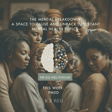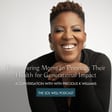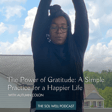
Rediscovering Self, SelfCare & Motherhood: A Conversation with Tiffany Heard
In this episode of the Sol Well Podcast, host Autumn Colon sits down with Tiffany Heard, a women's health advocate and coach, to discuss her journey of personal growth and self-discovery. Tiffany shares her experiences as a mother, the challenges she faced, and how she overcame adversity.
Guest Bio
Tiffany Heard, also known as The Selfish Bae, is a Peak Performance Mindset Coach specializing in Self-Care and Women's Health Advocacy. With over two decades of experience in the holistic healing space, Tiffany empowers individuals to transform their lives through fearless self-discovery, guiding them to embrace change, authenticity, and intentional living.
Having started her journey as a single mother to four children while pursuing her education in her late 20s, Tiffany knows firsthand the challenges of balancing personal growth with the demands of motherhood. She successfully navigated those early years, earning degrees in Science and Writing, becoming a licensed Massage Therapist and Reiki healer, and building a career as a coach and entrepreneur.
Now, as a newly single mother to an only child a role she has never had. Tiffany is embracing this new chapter in her life. She is committed to modeling self-care and prioritizing her own needs without guilt or shame, understanding that this is crucial not only for her well-being but also for her daughter’s development. By living authentically and putting herself first, Tiffany shows her daughter and others that self-care is essential for showing up fully in life.
Tiffany’s work is dedicated to helping others unlock their full potential by teaching them to be beautifully selfish. She believes that by taking care of yourself first, you can give more to those you love, leading a life of true fulfillment and purpose.
Key Takeaways:
- The Importance of Self-Care: Learn how self-care can help you navigate life's challenges and maintain mental well-being.
- Embracing Change: Discover strategies for adapting to change and finding opportunities for growth.
- Prioritizing Mental Health: Understand the significance of mental health, especially for mothers, and the importance of seeking support.
- Building Resilience: Learn how to develop resilience and overcome obstacles.
Connect with Tiffany On Social
@theselfishcoach
Additional Resources:
- SolWell Resources
- Join the Sol Well Community “The Mom Space”:
- Therapy for Black Girl
- Postpartum Support International
- National Alliance on Mental Illness (NAMI)
- 988 Suicide & Crisis Lifeline - Call. Text. Chat.
Join the Conversation:
Share your experiences and connect with others on social media using #SolWellPod and #IamSolWell. Let's create a supportive community for moms of color managing motherhood and mental health.
Don't forget to subscribe to Sol Well for more inspiring stories and practical advice!
Want to be a guest on the pod? Send us an email to podcast@solwell.co
By tuning in, you're taking a step towards prioritizing your mental health and well-being.





![Life after [baby] loss A conversation with Alishia Anderson image](https://media.zencastr.com/cdn-cgi/image/width=112,quality=85/image-files/61fb5028559b7100aee9f217/492cabf0-4479-488c-b19c-2873fe6bdce8.png)













